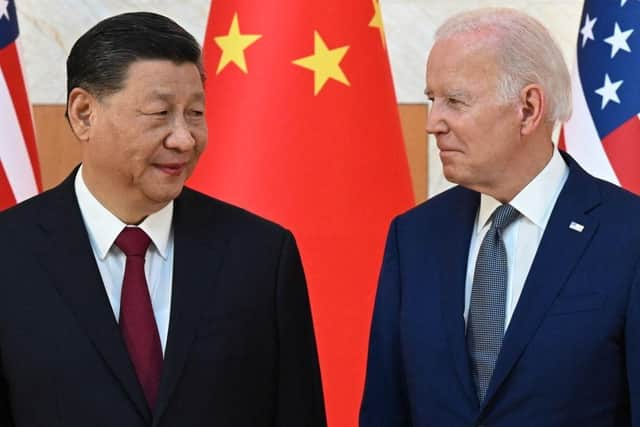G20: Why has China been described as the ‘biggest state-based threat’ to the UK?
Following a long period of rapprochement in the years leading up to and after the Beijing Olympic Games in 2008, the Western relationship with China has become more turbulent in recent times.
At the G20 summit in Indonesia this week, US president Joe Biden reassured the world there “need not be a new Cold War” with China following a three-hour meeting with Chinese president Xi Jinping.
Advertisement
Hide AdAdvertisement
Hide AdAfter the meeting, Mr Biden said the two leaders had reached “important common understandings”, and that he wanted to “put China-US relations back on the track of steady development”.


Yet the fact President Biden felt the need to say that at all is indicative of where things stand, amid claims of Chinese espionage, harassment and fears over the invasion of Taiwan – all things China denies. Mr Xi himself warned late last year against rising tensions in the Asia-Pacific region leading to a new Cold War.
Tensions over Taiwan, which China claims as its own territory and opposes it having its own engagements with foreign governments, increased this summer as US speaker Nancy Pelosi made a visit to the self-governing island. Mr Xi has said he wants to unify China and Taiwan by peaceful means, but has not ruled out force.
Earlier this week, the first Chinese government intelligence officer ever to be extradited to the United States to stand trial was sentenced for espionage and for attempting to steal trade secrets from an aviation company. Yanjun Xu, 42, was sentenced to 20 years behind bars, the US Department of Justice said, after he targeted American aviation companies, recruited employees to travel to China, and solicited their proprietary information, all on behalf of the government of the People’s Republic of China.
Meanwhile, in Canada, a public utility worker at Hydro-Quebec was arrested for allegedly spying for China. Yuesheng Wang, 35, was arrested by Canadian police and charged with espionage. Mr Wang "obtained trade secrets to benefit the People's Republic of China, to the detriment of Canada's economic interests", police said in a statement.
Canadian prime minister Justin Trudeau had a further run-in with Mr Xi in Indonesia at the G20, when the Chinese leader accused him of leaking meeting details after the pair held talks behind closed doors for the first time in years. “Everything we discussed has been leaked to the papers and that is not appropriate," Mr Xi told Mr Trudeau in Mandarin, in an exchange caught on camera.
Mr Trudeau responded by saying "in Canada we believe in free and open and frank dialogue and that is what we will continue to have".
"We will continue to look to work constructively together, but there will be things we disagree on," he added, before Mr Xi told him to “create the conditions” and walked away.
Advertisement
Hide AdAdvertisement
Hide AdThis all comes just weeks after MSPs discussed reports of secret Chinese “police stations” operating in 21 countries, including one reported to be concealed in a restaurant in Glasgow. First Minister Nicola Sturgeon insisted her Government and Police Scotland are taking the reports of of the secret Chinese Glasgow base “extremely seriously” – although the Scottish Government has not yet followed in the footsteps of other countries, including Ireland, in shutting down the alleged outposts.
Also speaking at the G20 summit, Mr Sunak warned China posed "a systemic challenge to our values and interests and it represents the biggest state-based threat to our economic security" – a sentiment echoed by Ken McCallum, head of MI5, in an annual update on international threats to the UK this week.
Mr Sunak recently announced plans to scrap China’s Confucius Institutes in the UK. The Confucius Institute has been compared to the British Council, or Germany’s Goethe Institute, as a cultural office abroad. However, critics have warned it is a propaganda arm for the Chinese Communist Party (CCP).
Scotland has the most Confucius Institutes in the UK, with the national centre, the Confucius Institute for Scotland, based at the University of Edinburgh. It was set up with backing from the Scottish Government, as well as Chinese authorities. Other branches of the institute are based in universities around Scotland, including the University of Glasgow, Strathclyde, Heriot Watt and Aberdeen, as well as in schools.
Earlier this week, Mr McCallum repeated warnings about attempts by China to influence politicians and other public figures, describing it as a “large and enduring challenge”, as well as referencing the harassment of Chinese citizens on British soil.
In October, a Hong Kong pro-democracy protester was allegedly beaten in the grounds of the Chinese consulate in Manchester, with the consulate general pictured at the scene.
Hong Kong, a former British colony, returned to Chinese rule in 1997. Under the “one country, two systems” principle, Hong Kong citizens experienced freedoms not enjoyed by their counterparts on the Chinese mainland, until 2000, when a new national security law was introduced, sparking widespread protests.
It has been claimed human rights have since been eroded in Hong Kong, which is home to many British expats, including a large number of Scots.
Advertisement
Hide AdAdvertisement
Hide Ad"To intimidate and harass UK nationals – or those who have made the UK their home – cannot be tolerated," Mr McCallum said. He compared China to Russia, using a sporting analogy, in which he said Chinese officials were trying to “rewrite the rule book”.
"Russia thinks nothing of throwing an elbow in the face and routinely cheats to get its way," he said. "The Chinese authorities present a different order of challenge. They're trying to rewrite the rule book, to buy the league, to recruit our coaching staff to work for them."
Comments
Want to join the conversation? Please or to comment on this article.